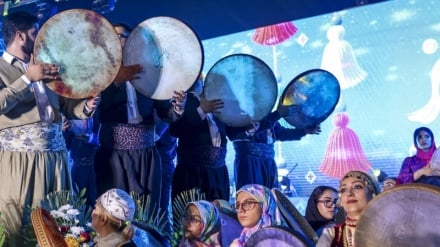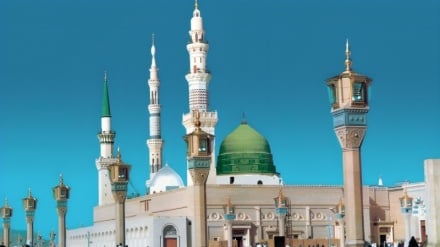Moharram, epic in the heart of grief
Moharram is the month of epic, bravery and self-sacrifice; the month in which blood triumphed over sword; and taught the whole mankind the way of confronting falsehood and evil.
As the month of Moharram arrives, Islamic countries and communities look different as the general mood of cities and villages changes spectacularly. Most people wear black clothes and hang black draperies on their houses and shops as a sign of mourning for the Chief of Martyrs, Imam Hussein (Peace upon him).
Moharram is the first month of the Islamic lunar calendar. The reason for naming it as Moharram is that war was haram (religiously forbidden) in this month. Nevertheless, Banu Umayya violated not only the sanctity of this month but the progeny of the Prophet as they shed the blood of Imam Hussein, his relatives and companions on the day of Ashura.
A hadith from Imam Reza (Peace upon him) reads, "Indeed, the day of Hussein's martyrdom wounded our heart and caused our tears to run… and left grief and calamity for us till the Judgment Day. Thus, those who cry should cry for Hussein." The eight infallible heir of the Prophet of Islam also said, "As the month of Moharram arrived, my father would not be seen smiling anymore and his sadness would increase from the first till the tenth of Moharram. The day of Ashura was the day of mourning, grief and crying for him; and he kept saying, 'This is the day on which Hussein was killed'."
The culture of mourning is a very rich tradition which has been bequeathed to us over decades of hardships of the Prophet's progeny. This culture has thousands of lessons and messages for us. The Ahl al-Bayt (progeny) of the Prophet would emphasize on holding mourning ceremonies for Imam Hussein as an axis of unity among Muslims. This has caused insight and awareness among the faithful. That's why, in Moharram, scores of millions of people with varying races, colors of skin, languages and nationalities respect this event and take part in the ceremonies of Imam Hussein's martyrdom. Imam Hussein (AS) in fact gathers people, even non-Muslims, under his banner.
According to the narrations of the infallible leaders, there is a great reward for crying on the martyrdom of Imam Hussein (AS). This is because this crying is different from other kinds of crying. It is not out of weakness or meanness. It rather symbolizes dignity and honour. This crying indicates a robust support of a 1400-year-old civilization which has acted as a beacon of guidance for human race. Imam Sadeq (AS) said, "It is improper for the servants of God to shout and cry in every affair except for Hussein son of Ali; because those who cry in this case will receive reward in afterlife."
Crying for Imam Hussein's martyrdom is indeed an indicative of the love for the Imam and a renewal of allegiance with him. Martyr Ayatollah Morteza Motahhari says, "Crying for martyr means participation in his epic, coordination with his spirit and compliance with his vividness and move. Imam Hussein, due to his lofty personality and due to his heroic martyrdom, is the owner of the hearts and sentiments of hundreds of millions of people. If the religious speakers manage to make the correct use of this huge reservoir in the way of conformity, compliance and consent of spirits with the great spirit of Hussein, the world will be reformed."
French thinker, Maurice deKobra, in response to those who oppose mourning for Hussein, says, "Had they known the reality of Ashura, they would not consider these mourning ceremonies as hysteric; because the followers of Hussein learn in these ceremonies not to abide by meanness, colonialism and exploitation, as it was the motto of their leader not to accept oppression."
German orientalist, Marbin, writes in the book Islamic Politics, "Lack of information of some of our historians has led to attributing hysteria to Shia mourning; whereas they have said nonsense and have calumniated Shia. We haven't seen among ethnicities and nations as fervent and lively as Shias, because Shias, due to holding mourning ceremonies for Hussein, have applied wise policies and created effective religious movements. If one looks into the course of perfection of Shias and studies the life of those who have held mourning for Hussein during the recent century, he will understand that Shias have reached the last phase of their perfection. One hundred years ago Shias and followers of Ali and Hussein were few in India but today the Shias of India are third in terms of religion and such is the case for other regions of the world. I think the mystery of survival and progress of Islam and perfection of Muslims lies in the martyrdom of Hussein and those sad events. And I am sure that the wise policies of Muslims and practicing their life-inspiring programs have originated from mourning for Hussein. As long as this way and trait exists among Muslims, they will never submit to meanness and won't be captivated by anyone."
Repetition of Moharram through time has made it clear that Imam Hussein (AS) and his companions were the victors of Karbala. Although they lost their lives at Karbala, they breathed new spirit into the corpse of Islam. They taught the way of fighting oppression to the world. In spite of the passage of over a millennium and several centuries from Imam Hussein's uprising, his name and epic have transcended time and place; and the more time passes the more radiantly his uprising shines and guides potential hearts and minds. Today, the oppressed and downtrodden people of the world have learnt from Hussein to resist strongly against bullies. Ayatollah Khamenei says, "Imam Hussein (AS) practically taught a great lesson to the entire history of Islam; and indeed, he insured Islam both in his time and in any other time. Wherever there is such a corruption, Imam Hussein (AS) is alive there. He tells you what to do by his way and practice. This is the duty. Thus, the memory of Imam Hussein and Karbala must be alive because the memory of Karbala puts this practical lesson before our eyes."
RM/MG


